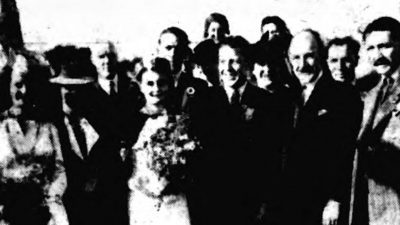On 15th August 1945, the United Kingdom celebrated the surrender of Japanese forces in the Pacific. After almost 6 years of war in Asia, V.J. Day or Victory over Japan Day marked a day of national celebration, commemoration, and reflection. Across Northern Ireland, people took to the streets, joining family and friends at parties, dances, and bonfires.
At 0000hrs on Wednesday 15th August 1945, Prime Minister Clement Attlee announced the end of the Second World War.
The last of our enemies is laid low.
In the United States of America, Victory over Japan Day is on 2nd September each year. This marks the anniversary of the signing of the surrender document on board U.S.S. Missouri in 1945.
V.J. Day was greeted with flags, and happy holiday makers. Once again two days holidays were granted. On V.J. Day the fellowship went to Castle Espie on Strangford Lough. We had a lovely day. Home in time for the King’s broadcast, and then we all met and went around town. We just went wild with everyone else and followed bands, etc. We had a light in our garden for decoration. Once again there were bonfires, and many parties, dancing in the open air.
From the scrapbook of Miss Betty Potter, Northern Ireland War Memorial.
While many were in a celebratory mood, others were more reflective, some considered the effects of the Atomic Bomb an outrage, and others were concerned about the effect of V.J. Day on their lives. For many in Northern Ireland, times were hard in 1945. On Tuesday 14th Agist 1945, John Heaney – Shop Steward of the Falls Depot, wrote to the Northern Whig newspaper.
Sir, When Victory over Japan is announced, most workers will receive the two days’ holiday, but those engaged on essential services will have to carry on and will receive payment in lieu. May I appeal, through your columns, to the Government department concerned, to see that the transport workers of the Belfast Corporation will not be taxed on the extra money received through working those two days.
Although V.J. Day marked the end of the Second World War, many of those from Northern Ireland serving in Asia did not return until 1946. This included many liberated Prisoners of War and those forced to work on the railways, and take part in death marches. Many thousands more never returned to Ulster having given their lives across Asia and the Pacific.
